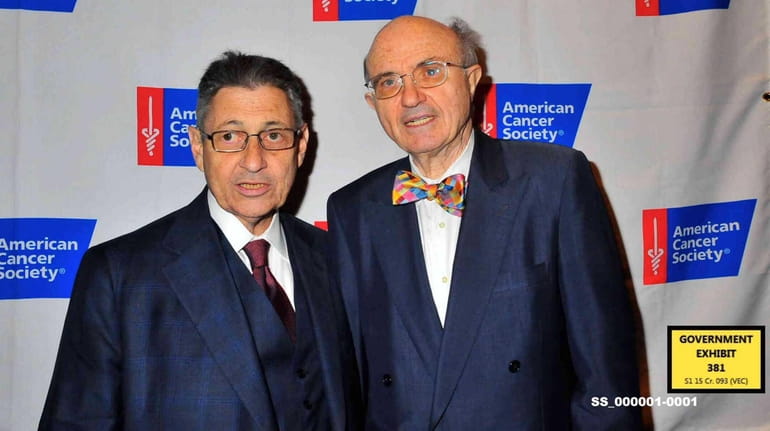Sheldon Silver's friendship with asbestos doctor challenged in federal trial

Evidence in former State Assembly Speaker Sheldon Silver's corruption trial includes a photo of Silver and Dr. Robert Taub, the government's star witness, attending an American Cancer Society fundraising dinner. Credit: United States Attorney's Office
The asbestos doctor who allegedly bribed former Assembly Speaker Sheldon Silver by referring patients to his law firm gave contrasting versions of whether the referrals were part of a "quid pro quo" for state research grants or the result of friendship, in testimony at Silver's corruption trial Thursday.
Star government witness Dr. Robert Taub, in his second day on the stand, admitted on cross-examination that he did not sign an immunity agreement proposed by prosecutors that said the referrals were "in exchange for" grant money, and the phrase was removed after talks with his lawyer and the government.
"That is correct," said Taub, who needed immunity because he had earlier lied to investigators, in response to a question from Silver lawyer Steve Molo.
In later questioning by the government, however, Taub admitted he wrote in a 2010 email to another asbestos-victims advocate that patient referrals were a way to get access. "I will keep giving cases to Shelly because I may need him in the future -- he is the most powerful man in New York State," Taub wrote.
In the same exchange, Taub noted that Silver's law firm gave no support to asbestos research, but explained his willingness to continue making referrals by quoting the Bible and noting, "No enterprise . . . ever, ever grew or succeeded as a result of pure righteousness. Usually success is propelled by greed, envy or both."
Silver, 71, is charged with bribe-taking, extortion, and money-laundering. He allegedly made $4 million in legal fees in return for giving Taub $250,000 state grants in 2005 and 2006 for mesothelioma research, and for doing favors for developers in a separate scheme.
Prosecutors contend Taub, 79, a prominent asbestos-disease researcher at Columbia University until he was fired in the wake of Silver's indictment, gave dozens of potentially lucrative asbestos case referrals to Silver and his law firm, Weitz & Luxenberg, over 10 years as part of a quid pro quo arrangement.
But in direct testimony earlier this week, he was ambiguous, repeating several times that he and Silver were friendly and that the referrals were designed to strengthen a "relationship" that might "incentivize" Silver to support mesothelioma victims and fund research, and saying there was no "explicit" agreement.
The removal of the phrase "in exchange for" appeared to support defense claims the referrals and grants were not connected. Taub did not explain the change and didn't recall discussions at the time, but told Molo he remembered he wanted the document to be "accurate."
Prosecutors responded with sharp questioning of Taub on their "redirect" examination, eliciting his email comments about Silver's power and asking whether he referred patients to any law firm other than Silver's.
"I don't recall any," Taub said.
The prosecution and defense also clashed over details Taub gave about his "friendship" with Silver.
Taub told Molo they were both Orthodox Jews, socialized in the same circles, and spent family Passovers together at the same hotel.
Taub appeared to dismiss prosecution claims Silver did personal favors for Taub's family to encourage referrals -- providing funding for a favorite charity and helping his daughter get an internship and his son a job -- testifying that he did not make referrals to get those perks.
But prosecutor Andrew Goldstein made light of the claim of friendship, noting that there 900 to 1,200 other Passover guests at the hotel the Silvers and Taubs shared, and asking Taub if the friendship began before or after he began referring cases.
"The basis was the fact that I had referred patients to him," Taub testified, "and it developed from that."
In other testimony Thursday, prosecutors called an Assembly budget aide to describe Silver's control over the $8.5 million pool of money he used to fund Taub's mesothelioma research.
The aide, Victor Franco, said members could make requests, but there was no competitive vetting process for the proposals that would be forwarded to the state Department of Health. "The speaker was the ultimate decision-maker," he said.
Prosecutors also used Franco to offer an explanation why Silver might have stopped giving grants in 2007.
Although the health care money ran out, Franco said, Silver could have used an even larger pool of "member item" money he controlled, with an allotment far larger than other legislators. But by 2006, Silver would have had to publicly post a disclosure that he sponsored a member item.
For the health care money he used in earlier years, Franco said, "There were no posting requirements."The trial resumes Monday.
Updated 20 minutes ago Man who drove car off cliff due in court ... Fire rips through Amityville home ... Trump on trial ... Lego camp
Updated 20 minutes ago Man who drove car off cliff due in court ... Fire rips through Amityville home ... Trump on trial ... Lego camp
